
What is the Role of Dairy Equipment Suppliers in Modern Dairy Farming
In modern dairy farming, the role of dairy equipment suppliers has become increasingly pivotal as the industry strives for efficiency, sustainability, and enhanced productivity. According to a report by the International Dairy Federation (IDF), advancements in dairy equipment have led to a 20% increase in milk yield per cow in the past decade, highlighting the critical impact that technology and innovation bring to the sector. For dairy farmers, partnering with reliable dairy equipment suppliers not only enhances operational effectiveness but also contributes to quality control and compliance with stringent hygiene standards.
Industry expert Dr. Mark Jensen, a respected figure in dairy technology, emphasizes the importance of these suppliers, stating, "The right equipment can dramatically transform the dairy operation, making it smarter and more sustainable." This transformation is underscored by the ongoing demand for automated milking systems and precision dairy farming tools, which are reshaping traditional practices. As dairy equipment suppliers continue to innovate and introduce cutting-edge products, their influence on the future of dairy farming will be paramount in meeting the challenges of a growing global population and increasing food security concerns.

The Importance of Dairy Equipment Suppliers in Streamlining Operations
In modern dairy farming, the role of dairy equipment suppliers is pivotal in streamlining operations. These suppliers provide advanced machinery and tools that enhance productivity and efficiency on the farm. From automated milking systems to sophisticated feed management technologies, the equipment available today allows dairy farmers to optimize their workflows, reduce labor costs, and improve the quality of their products. By integrating these technologies, farmers can monitor herd health, manage data more effectively, and ultimately achieve higher yields.

Tips for choosing the right dairy equipment supplier include researching their reputation in the industry, ensuring they offer reliable after-sales support, and evaluating the range of products they provide. Consider suppliers who stay updated with the latest innovations in dairy technology, as this can significantly influence operational efficiency. Engaging with suppliers who prioritize sustainability and energy efficiency can also lead to long-term cost savings.
Furthermore, investing in training and support from equipment suppliers can maximize the benefits of new technologies. This ensures that all staff are fully educated on proper equipment use and maintenance, leading to fewer breakdowns and higher productivity levels. Forming a strong partnership with reliable suppliers can be a game-changer for dairy operations, creating a foundation for success in an ever-evolving industry.
Innovative Technologies Offered by Dairy Equipment Suppliers
The role of dairy equipment suppliers in modern dairy farming is increasingly pivotal as they introduce innovative technologies that enhance production efficiency and product quality. The global dairy packaging machine market is projected to see significant growth, expanding from USD 21 billion in 2024 at an impressive CAGR of 5.1% through 2034. This reflects a rising demand for advanced packaging solutions that dairy suppliers can leverage to meet consumer expectations.
In addition to packaging, technology is reshaping the entire dairy manufacturing landscape. Innovations such as precision agriculture and AI-driven tools are proving vital in managing resources more sustainably and increasing yields. For instance, membrane technology is emerging as a key area of development, helping dairy processors improve product quality while minimizing waste.
Tips:
2. Consider collaborating with research institutions to stay ahead of market trends and technological advancements.
3. Regularly assess your equipment for efficiency to ensure optimal resource utilization and sustainability.
How Dairy Equipment Suppliers Enhance Milk Quality and Animal Welfare
In modern dairy farming, the role of dairy equipment suppliers is crucial in enhancing both milk quality and animal welfare. According to a report by the International Dairy Federation, dairy farms that invest in advanced milking technology can see a 20% increase in milk yield attributed to better milking efficiency and cow comfort. Equipment like automated milking systems not only reduce the stress on animals but also help in maintaining consistent milking conditions, which leads to higher quality milk production.
Moreover, dairy equipment suppliers provide essential tools for monitoring animal health and wellbeing. For instance, automated cow monitoring systems track vital signs and activity levels, facilitating early detection of health issues. A study published by the Journal of Dairy Science indicates that farms employing such technologies reported a 30% reduction in illnesses among dairy cows, significantly improving their welfare. These advancements not only contribute to the overall productivity of dairy farms but also ensure that dairy products meet stringent quality standards, ultimately benefiting consumers.
Impact of Dairy Equipment on Milk Quality and Animal Welfare
Understanding the Financial Impact of Investing in Modern Dairy Equipment
Investing in modern dairy equipment is crucial for enhancing the efficiency and productivity of dairy farms. The financial impact of such investments can be significant, as advanced technologies often lead to improved milk yield and quality. For instance, automated milking systems can reduce labor costs and streamline operations, allowing farmers to focus on other essential aspects of their business. Over time, the money saved on labor and the increased production can offset the initial investment, leading to a more profitable operation.

Furthermore, modern dairy equipment often includes enhancements that improve herd health and sustainability. For example, milking parlors equipped with sensors can monitor the health and productivity of each cow in real time, facilitating prompt action in case of any issues. This proactive approach not only reduces veterinary costs but also ensures the overall well-being of the herd, which is vital for long-term profitability. As dairy farms strive to meet rising market demands and higher standards, the decision to invest in modern equipment becomes not just beneficial but essential for financial success in the competitive dairy industry.
Key Considerations When Choosing a Dairy Equipment Supplier for Your Farm
Choosing the right dairy equipment supplier is crucial for the success of modern dairy farming. One of the key considerations is the supplier’s ability to provide technology that enhances milk production efficiency. According to a report by the International Dairy Federation, the integration of advanced milking systems can improve milking efficiency by up to 30%, leading to increased profitability. Therefore, farmers should look for suppliers that offer innovative solutions such as automated milking systems and herd management software that can streamline operations and reduce labor costs.
Another important factor is the supplier’s commitment to after-sales support and maintenance services. A study by Dairy Australia highlights that equipment downtime can significantly impact dairy operations, potentially costing farms thousands of dollars in lost productivity. Farmers should seek suppliers that provide comprehensive training, prompt technical assistance, and readily available spare parts to minimize downtime. By evaluating these aspects, dairy farmers can select suppliers that not only meet their current needs but also support their future growth and productivity goals in a highly competitive market.
Related Posts
-
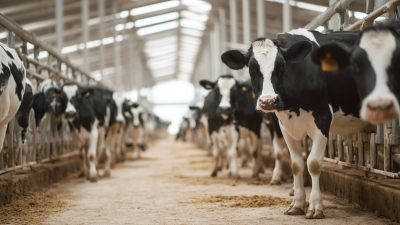
Essential Guide to Choosing Innovative Dairy Milking Equipment for Modern Farms
-
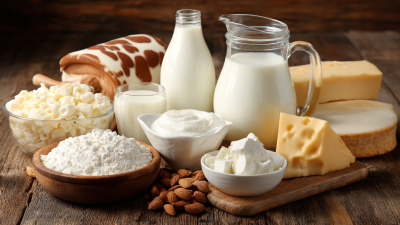
Exploring the Nutritional Benefits of All Dairy Products: What Recent Studies Reveal
-
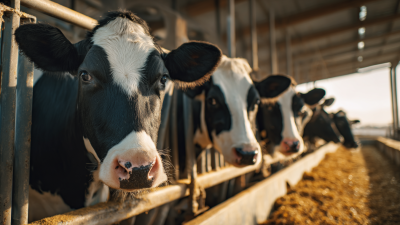
The Future of Dairy Farming How Cow Milking Equipment is Revolutionizing Milk Production
-

Exploring the Health Benefits of Consuming Diverse Milk Products in Your Daily Diet
-
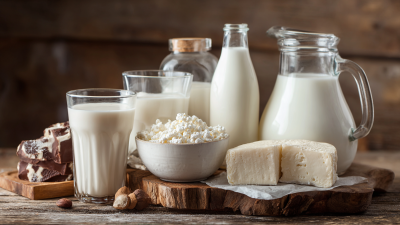
Top 10 Must Try Dairy Milk Products for a Creamy Delicious Experience
-
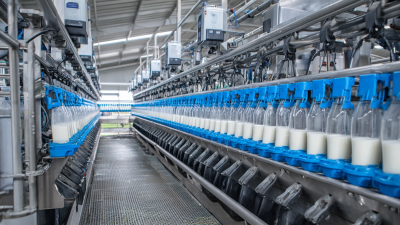
2025 Top Milking Equipment Innovations for Modern Dairy Farming
